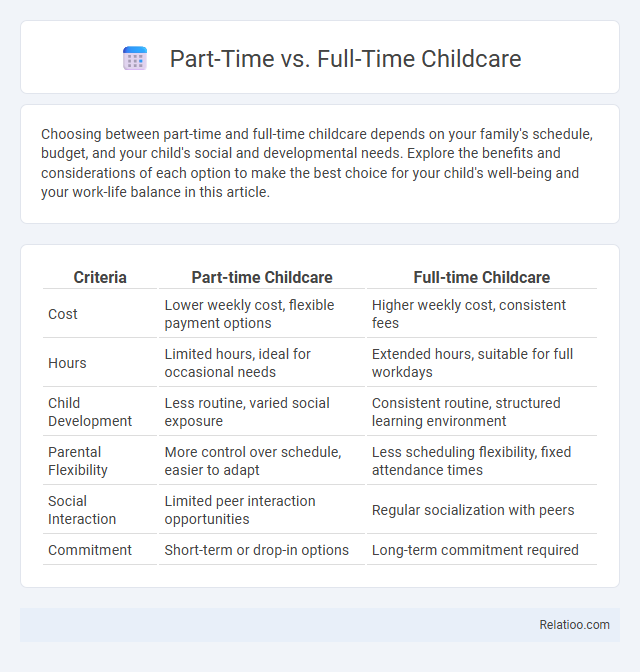Choosing between part-time and full-time childcare depends on your family's schedule, budget, and your child's social and developmental needs. Explore the benefits and considerations of each option to make the best choice for your child's well-being and your work-life balance in this article.
Table of Comparison
| Criteria | Part-time Childcare | Full-time Childcare |
|---|---|---|
| Cost | Lower weekly cost, flexible payment options | Higher weekly cost, consistent fees |
| Hours | Limited hours, ideal for occasional needs | Extended hours, suitable for full workdays |
| Child Development | Less routine, varied social exposure | Consistent routine, structured learning environment |
| Parental Flexibility | More control over schedule, easier to adapt | Less scheduling flexibility, fixed attendance times |
| Social Interaction | Limited peer interaction opportunities | Regular socialization with peers |
| Commitment | Short-term or drop-in options | Long-term commitment required |
Understanding Part-Time and Full-Time Childcare
Understanding part-time and full-time childcare is essential for selecting the right care solution that fits your family's needs. Part-time childcare typically involves care for fewer than 30 hours per week, ideal for parents with flexible schedules or those who need supplemental support. Full-time childcare often exceeds 30 hours weekly, offering structured environments and consistent routines that benefit children's social and cognitive development.
Key Differences Between Part-Time and Full-Time Childcare
Part-time childcare typically involves fewer hours per week, offering flexibility for parents with varying schedules, whereas full-time childcare provides consistent, daily care essential for working parents requiring extended supervision. Cost differences are significant, with full-time childcare generally charging higher fees due to prolonged care and additional services such as meals and structured activities. Availability and scheduling also differ, as part-time childcare may accommodate drop-in or occasional needs while full-time childcare usually requires long-term enrollment and commitment.
Pros and Cons of Part-Time Childcare
Part-time childcare offers flexibility for parents who need occasional care, allowing you to balance work and family commitments without the higher cost of full-time services. It provides socialization opportunities and structured activities for children, though it may lack the consistency and routine that full-time childcare delivers. However, parents might face challenges in securing available part-time slots or coordinating schedules, which can impact convenience and continuity of care.
Advantages and Disadvantages of Full-Time Childcare
Full-time childcare offers consistent supervision and structured routines, promoting social development and early learning skills in children. Your child benefits from stable interaction with caregivers, but full-time care can be costly and may reduce family bonding time. Balancing affordability and emotional connection is crucial when choosing full-time childcare.
Cost Comparison: Part-Time vs Full-Time Childcare
Part-time childcare costs are generally lower than full-time childcare, making it a budget-friendly option for parents who do not require extensive daily coverage. Full-time childcare typically involves higher fees due to increased hours and added benefits like meals and extended supervision. Your choice between part-time and full-time childcare should consider your family's budget constraints and the specific care needs of your child.
Flexibility and Scheduling Considerations
Part-time childcare offers greater flexibility for parents managing variable schedules, allowing tailored hours that align with work or personal commitments. Full-time childcare provides consistent, structured routines essential for children's development and supports parents with fixed work hours by ensuring reliable daily care. Evaluating scheduling needs alongside childcare type helps optimize both child well-being and family work-life balance.
Impact on Child Development and Socialization
Part-time childcare offers children opportunities for socialization in smaller, less structured settings, promoting adaptability and independence, while full-time childcare provides consistent routines and extended peer interaction, enhancing emotional resilience and collaborative skills. Full-time childcare environments often include more comprehensive developmental activities, fostering cognitive growth and language acquisition at a faster rate compared to part-time care. The choice between part-time and full-time childcare significantly influences a child's social competence and developmental milestones, with both types contributing uniquely to socialization and overall growth.
Parental Work-Life Balance and Childcare Choices
Choosing between part-time, full-time, and general childcare directly impacts your parental work-life balance by influencing daily schedules and stress levels. Part-time childcare offers flexibility for parents working reduced hours or seeking to gradually transition back to work, promoting better work-family harmony. Full-time childcare suits parents with standard work hours but demands reliable, consistent care to maintain stability, highlighting the importance of tailored childcare choices for optimizing both career and family well-being.
How to Choose Between Part-Time and Full-Time Childcare
Choosing between part-time and full-time childcare depends largely on work schedules, budget constraints, and the child's social development needs. Part-time childcare offers flexibility and lower costs for parents with irregular or reduced working hours, while full-time childcare provides consistent care, structured learning environments, and socialization opportunities crucial for early childhood development. Evaluating factors such as parental availability, the child's temperament, and long-term educational goals helps determine the optimal childcare arrangement.
Frequently Asked Questions on Childcare Options
Choosing between part-time and full-time childcare depends on your family's schedule, budget, and your child's social needs. Part-time childcare offers flexibility and lower costs, ideal for parents working reduced hours or seeking gradual socialization, while full-time childcare provides consistent structure and comprehensive developmental activities, suitable for families with standard work hours. Understanding these options helps you make informed decisions about the best care setting to support your child's growth and your daily routine.

Infographic: Part-time vs Full-time Childcare
 relatioo.com
relatioo.com